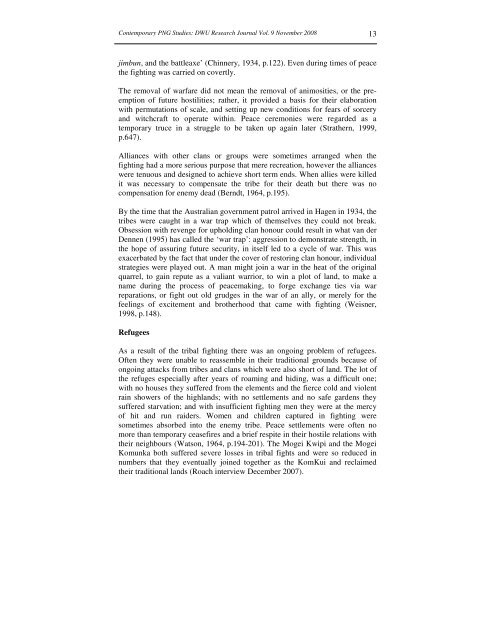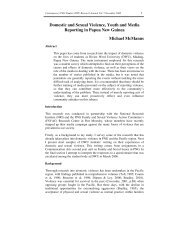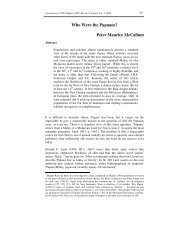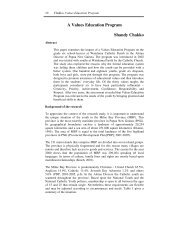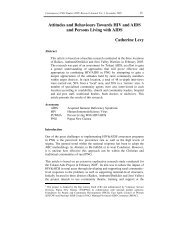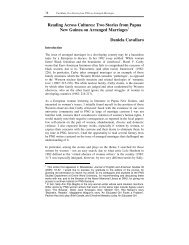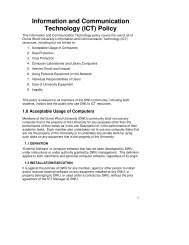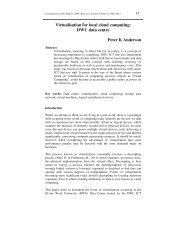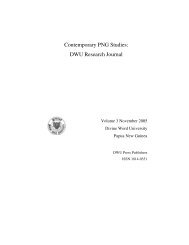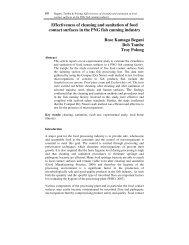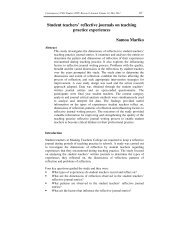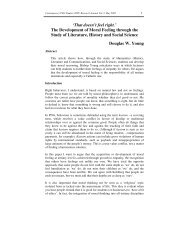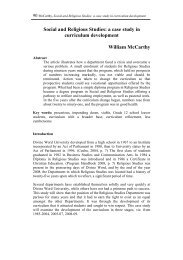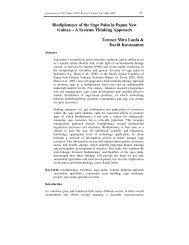A short study of Melpa rehistory - Divine Word University
A short study of Melpa rehistory - Divine Word University
A short study of Melpa rehistory - Divine Word University
- No tags were found...
Create successful ePaper yourself
Turn your PDF publications into a flip-book with our unique Google optimized e-Paper software.
Contemporary PNG Studies: DWU Research Journal Vol. 9 November 2008 13jimbun, and the battleaxe’ (Chinnery, 1934, p.122). Even during times <strong>of</strong> peacethe fighting was carried on covertly.The removal <strong>of</strong> warfare did not mean the removal <strong>of</strong> animosities, or the preemption<strong>of</strong> future hostilities; rather, it provided a basis for their elaborationwith permutations <strong>of</strong> scale, and setting up new conditions for fears <strong>of</strong> sorceryand witchcraft to operate within. Peace ceremonies were regarded as atemporary truce in a struggle to be taken up again later (Strathern, 1999,p.647).Alliances with other clans or groups were sometimes arranged when thefighting had a more serious purpose that mere recreation, however the allianceswere tenuous and designed to achieve <strong>short</strong> term ends. When allies were killedit was necessary to compensate the tribe for their death but there was nocompensation for enemy dead (Berndt, 1964, p.195).By the time that the Australian government patrol arrived in Hagen in 1934, thetribes were caught in a war trap which <strong>of</strong> themselves they could not break.Obsession with revenge for upholding clan honour could result in what van derDennen (1995) has called the ‘war trap’: aggression to demonstrate strength, inthe hope <strong>of</strong> assuring future security, in itself led to a cycle <strong>of</strong> war. This wasexacerbated by the fact that under the cover <strong>of</strong> restoring clan honour, individualstrategies were played out. A man might join a war in the heat <strong>of</strong> the originalquarrel, to gain repute as a valiant warrior, to win a plot <strong>of</strong> land, to make aname during the process <strong>of</strong> peacemaking, to forge exchange ties via warreparations, or fight out old grudges in the war <strong>of</strong> an ally, or merely for thefeelings <strong>of</strong> excitement and brotherhood that came with fighting (Weisner,1998, p.148).RefugeesAs a result <strong>of</strong> the tribal fighting there was an ongoing problem <strong>of</strong> refugees.Often they were unable to reassemble in their traditional grounds because <strong>of</strong>ongoing attacks from tribes and clans which were also <strong>short</strong> <strong>of</strong> land. The lot <strong>of</strong>the refuges especially after years <strong>of</strong> roaming and hiding, was a difficult one;with no houses they suffered from the elements and the fierce cold and violentrain showers <strong>of</strong> the highlands; with no settlements and no safe gardens theysuffered starvation; and with insufficient fighting men they were at the mercy<strong>of</strong> hit and run raiders. Women and children captured in fighting weresometimes absorbed into the enemy tribe. Peace settlements were <strong>of</strong>ten nomore than temporary ceasefires and a brief respite in their hostile relations withtheir neighbours (Watson, 1964, p.194-201). The Mogei Kwipi and the MogeiKomunka both suffered severe losses in tribal fights and were so reduced innumbers that they eventually joined together as the KomKui and reclaimedtheir traditional lands (Roach interview December 2007).


